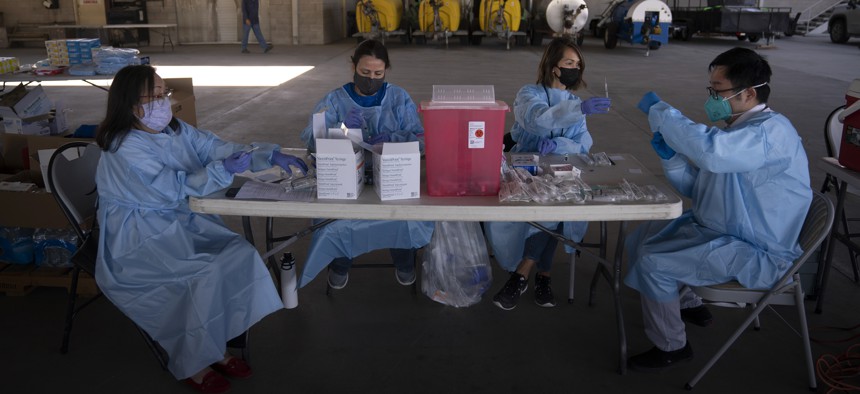Public Health Workers Make Case for Student Loan Repayment Program

In this Jan. 21, 2021, file photo, health care workers prepare the Pfizer-BioNTech COVID-19 vaccine for farm workers at Tudor Ranch in Mecca, Calif. AP Photo/Jae C. Hong
The House Energy and Commerce Committee heard testimony Tuesday on a bill that would forgive up to $35,000 annually in student loans for individuals who work in public health for three years.
Workforce turnover in the Granville Vance Public Health Department in North Carolina typically ranges between 2% and 5% in a normal year. But the coronavirus pandemic has made the last two years have been anything but normal—the annual turnover rate stands at 12%, said Lisa Macon Harrison, the department’s director.
Testifying before a congressional committee Tuesday, Macon Harrison, who is also the president of the National Association of County and City Health Officials, endorsed legislation that would establish a student loan repayment program for public health professionals. The goal of the program is to make it easier to recruit workers for what can often be stressful, low-paying jobs.
“The challenges we face are low salaries and salary bands that are not updated frequently at the state level,” Macon Harrison said during the hearing before the House Energy and Commerce Committee. “These loan repayment opportunities will help us with recruitment because they are better targeted to local public health in particular.”
The Public Health Workforce Loan Repayment Act, which has bipartisan backing from committee members, would repay up to $35,000 in student loans a year for qualifying public health professionals. To be eligible, individuals would have to be in their final year of school pursuing a public health or health degree or have graduated within the past 10 years. Those individuals must go on to work for a local, state or tribal public health agency and sign a service commitment for at least three years in public health.
Programs like this are critical to help recruit new workers for public health agencies where many employees, burned out by the stress of the last two years, are expected to resign as the pandemic subsides, Macon Harrison said.
“As many of my colleagues have stated, they are committed to staying the course during the crisis but will leave as soon as the threat is abated,” Macon Harrison said.
Their reasons for leaving vary, she said.
“For some it is the intense polarization and threats that drive them away,” she said. “Others are lured away by better paying opportunities and hospitals in the private sector while still others are leaving due to mental health.”
Six-Years of Funding
The House bill would provide $100 million in funding for loan repayment in fiscal 2021 and $75 million annually for five years after that. NACCHO estimates that $200 million in loan repayment funding would support approximately 6,000 public health jobs—an average of two staff per each local, state and tribal health department.
Members of Congress lamented worker shortages that public health agencies and hospitals in their districts are facing.
Rep. Gus Bilirakis, a Republican, said one of the hospital systems in his Florida district has more than 1,000 openings for registered nurses. Rep. Anna Eshoo, a California Democrat, said she expects the program could be extremely popular.
‘I think if that fund were in place now, there would be a run on the money because needs are so great,” she said.
Municipal workforce recruitment has become particularly difficult during the pandemic as all manner of government agencies across have faced staffing shortages, including public safety, waste management, and schools.
To address the challenge, the Biden administration took steps this year to support recruitment efforts in public service.
The U.S. Department of Education announced plans this month to overhaul a student loan forgiveness program for public sector workers. That program was plagued with problems that made it difficult for qualifying workers to get loan forgiveness applications approved. More than 98% of people who applied for loan forgiveness under the program were rejected, according to federal data, including thousands of teachers.
Andrea Noble is a staff correspondent with Route Fifty.
NEXT STORY: The Future of Work Is Hybrid – Here’s an Expert’s Recommendations for Success





